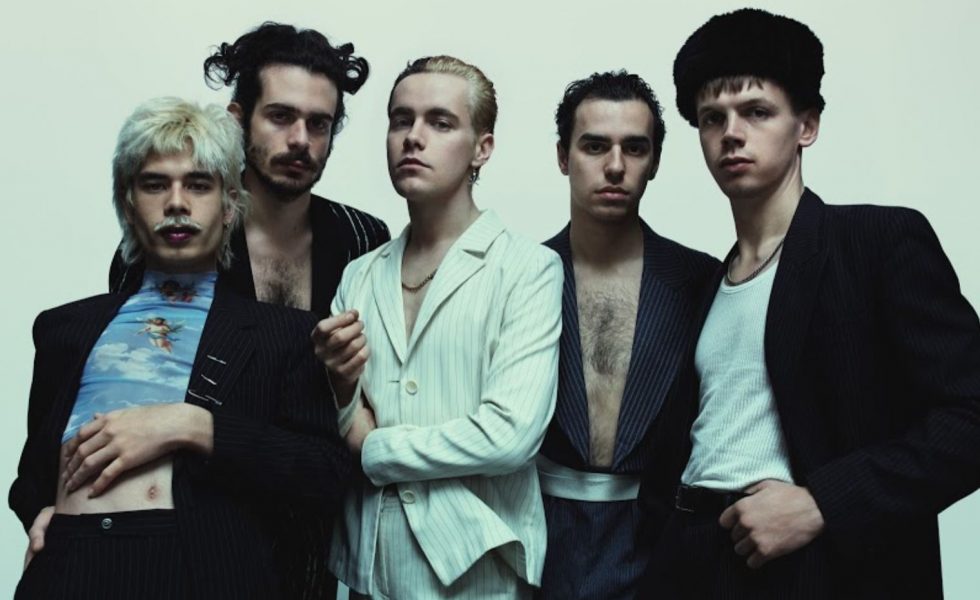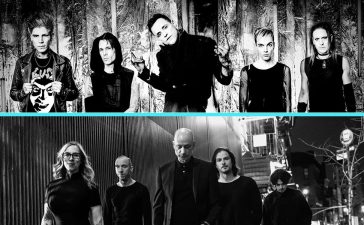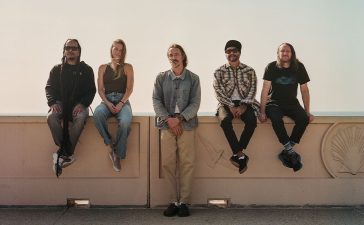Like a diamond, HMLTD formed in a very specific set of circumstances. If a single molecule had been out of place, there’s every chance the band wouldn’t be here today. The English lads are no carbon copy of UK go-to’s The Strokes – each song on their debut record West of Eden is informed by a different genre, from musical theatre to trap to punk, and a different aspect of their experiences as individuals. The latter is fundamental to HMLTD’s debut effort, which Blunt Magazine would learn speaking with enigmatic frontman Henry Spychalski, The concept of individual identity in a conformist society forms the basis of the whole record.
“It became very clear to us by that process of looking back retrospectively”, frontman Henry Spychalski clarified, “that what we were really interested in was all these themes that you find on the record, like late capitalism and patriarchy and about trying to exist against this backdrop. So from that point, once we recognised that constellation with our previous material, it was just this process of basically drawing up the lines and filling in the gap to actually make into an image.”
The output of that was the final concept record of West of Eden, but the journey to releasing it wasn’t easy. After unveiling groundbreaking single ‘The The Door’ three years ago, HMLTD were faced with criticism for seemingly appropriating queer culture.
“To us it just seemed sad”, Spychalski noted. “It seemed so obvious that what we were doing was trying to critique toxic masculinity and in that sense, it was allied with queer goals.” It was a moment that gave him empathy for understanding why audiences were so quick to judge, however. “Capitalism has basically taken every space and every piece of property except the South”, he added. “So there’s a pretty heightened sense of self-ownership, which informs this form of identity politics.”
It’s a point that’s hard to argue with, which is that it makes sense that viewers would assume the band were trying to profit off the traits of a historically marginalised community when it so often happens. “Most people have never had a problem with it”, Spychalski points out. “But it has been overstated a lot in the press. I think that most people realise that an important aspect of what we’re doing is this challenge to toxic maleness.”
That challenge is what Spychalski articulates as proposing “an alternative vision” to the accepted features of masculinity. The vision is “essentially more sensitive, more empathetic, more compassionate and more creative. I think that one thing that you really see in culture is how within straight cis male circles, creativity is just trampled…it’s almost just seen as totally taboo, such strict confines of anti-creative, with maleness. So we wanted to challenge that.”
The scramble to encourage listeners to see that HMLTD have genuine intentions hasn’t been for nothing though. For the most part, it has been successful, and we all know that difficult times make for great artistic inspiration.
“Had things happened differently, this album wouldn’t be the same”, Spychalski contemplates. “I don’t think it would be as good. It wouldn’t be as rich artistically….So in that sense, I am really bizarrely, counter-intuitively grateful that we have come through all that struggle. That’s not to negate the fact that it was fucking hard.”
Having painted the full picture on their debut album of our society, so opposite to the paradisaical Eden, it’s hard to understand what could come next from HMLTD. While we recognise that we can challenge norms inherent in our society, encouraging a questioning of traditional masculinity and solving the problem of rampant capitalism trumping our morals are vastly different prospects.
“We still want to have that critique of capitalism as an inherent part of what we do”, Spychalski states. He doesn’t want the next album to be as “strict”, telling the story of Western communities albeit in an experimental, theatrical way, but widening the lens won’t rob HMLTD of their focus on holding a mirror to civilisation. Hopefully the isolation that we’re currently in the world over gives HMLTD time to define what that will sound like.






